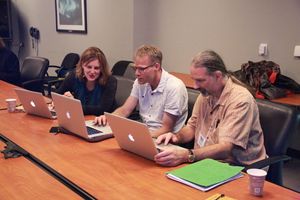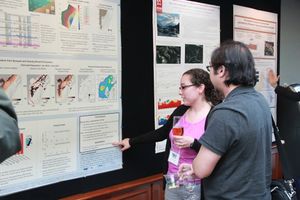Proposal support
Letters of Support for New Proposals
CSDMS offers principal investigators opportunities to reach out beyond their own project team to effectively 1) share their models source code and modeling data and 2) communicate their methods and results to the interdisciplinary earth surface processes modeling community (broader impacts).
CSDMS will commit to maintenance of a community model repository, which allows for open sharing of metadata, model source code and a model code version control system (Github), which ensures better code sustainability. See also the section on help with your Data Management Plan.
To request a letter of commitment for your proposal from the CSDMS director please email us at csdms@colorado.edu at least 5 working days before your proposal deadline.
Include the following information:
- PI Name and Contact Information
- Proposal Title
- A paragraph describing your plan for interacting with the CSDMS Integration Facility
Use CSDMS to address your Broader Impacts
We can help individual earth surface modeling projects with broadening their impact beyond their own research collaboration teams. We list here some of the possibilities of reaching out to our 2531 current CSDMS members representing over 180 U.S. institutions and 330 non-US institutions:
Broadcast Your Successes
The CSDMS web portal Highlights and Twitter Feed allow you to advertise your new codes, share interesting features from your scientific papers, invite people to use your animations or other educational products and broadcast other important information to the larger community.
Not on twitter? To submit a tweet, email: CSDMSweb@colorado.edu and send the short message and weblink you’d like to share with the CSDMS followers.
Highlights: If you would like to showcase your research or new on the CSDMS wiki front page, please write up a 200-word summary, and include an interesting figure, a reference, a pointer to the code repository if relevant, and your contact information or personal/lab webpage. Email this information to the CSDMS EKT specialist and we will work with you to create the highlight: irina.overeem@colorado.edu
Provide a Clinic

Clinics are an excellent way to inform the community about your new models or tools and give them some live exposure! This is an efficient way to reach out to a group of 20-40 possible users or (future) collaborators. Two-hour clinics are offered as part of the CSDMS Annual Meeting. These clinics provide hands-on experiences with specific models, model development techniques, or cyber-informatics. If you have participant support for a clinic, we encourage you to work with CSDMS six to eight months prior to our Spring meeting. We will be happy to help with the logistics of bringing students and early career scientist to Boulder to attend the Annual Meeting and your clinic. Early communication of your willingness to teach a clinic is very important!
Please email us at csdms@colorado.edu and let us know of your plan, including a short description of the objective and content of a proposed clinic.
Develop Online Educational Material

The CSDMS Educational Repository features documented model animations, modeling spreadsheets and online modeling labs for teachers to use. All of these resources are intended to be fully available to students and teachers to use for their own lectures and hands-on modeling labs. Most commonly, the target audience is undergraduate students for movies and spreadsheets, and graduate students for modeling labs.
Each product is attributed to its contributor, and the CSDMS youtube channel and web portal allow for counting visits (and possibly more advanced use metrics in the future).
For advanced products such as a design of an online short course, we encourage you to develop your materials in collaboration with the CSDMS EKT Specialist, irina.overeem@colorado.edu (find more about collaboration under programming and teaching support).
CSDMS Facilitates Data Management
CSDMS advocates that model source codes should be publicly available for reproducibility. We facilitate this through the maintenance of a community Model Repository. CSDMS also strives to ensure software sustainability and promotes collaboration by embedding codes in a version-control system, GitHub. Many major journals now require links to available code.
NSF proposals require a Data Management Plan for assuring the accessibility and preservation of data generated by a project. Similarly, model source code developed or enhanced by a project should be made available after sufficient calibration and documentation. The CSDMS Integration Facility can assist in complying with these protocols for developed model codes.
Developed models from individuals and projects can be made available in its original research-grade code through the CSDMS model repository. The repository features concise descriptions of the available models (i.e. model metadata, information on developers, input and output data formats, model spatial and temporal coverage, model theory & key equations, and numerical schemes). Models can be contributed by completing a questionnaire located here: LINK. These models are thus available to the public for free download from or through the CSDMS repository. We will point to the model repository in publications and, vice versa, list key references as part of the model metadata. Additionally, we embed the model on GitHub as a tool for source code version control. All applied models for a proposed project can then be directly available for download after scientific publication. We encourage you to cite the model repository in your publications and, conversely to list key references as part of the model metadata.
In addition, CSDMS maintains a Data Repository. This repository aims to share links to model input datasets, and maintain model benchmark datasets. CSDMS does not have mandate or the storage capacity to publish disciplinary data. You can discuss your data storage needs with us, and we can likely accommodate datasets as long as there is a clear relevance to earth surface processes modeling efforts.
